What Does Tahini Taste Like? Nutty Goodness in Every Spoonful
Tahini, a creamy sesame seed paste, sparks curiosity among food enthusiasts and culinary adventurers worldwide.
Middle Eastern and Mediterranean cuisines have long celebrated this versatile ingredient in numerous dishes.
Nutty and rich, this condiment carries a complex flavor profile that intrigues many palates.
Skeptics and newcomers often wonder about its unique characteristics and potential culinary applications.
Some might feel uncertain about incorporating tahini into their cooking repertoire.
Fortunately, understanding its nuanced taste can transform your approach to international and health-conscious recipes.
Your next culinary journey begins with uncovering the delightful secrets of this remarkable ingredient.
Tahini Overview
Sesame seed paste, known as tahini, starts with carefully prepared seeds.
Seeds are first soaked in water, which helps remove their outer layer.
After soaking, seeds get crushed and stripped of their outer coating.
Kernels rise to the water's surface and are skimmed away.
Seeds then receive another round of toasting and saltwater soaking before becoming a smooth, thick mixture.
Consistency feels similar to natural peanut butter - greasy and silky.
Middle Eastern and Mediterranean cooking frequently features tahini.
Chefs mix this paste into popular dishes like hummus and baba ghanoush.
Tahini works well as a sauce for fish, pork, and vegetables.
Cooks can create delicious salad dressings by blending tahini with apple cider vinegar, olive oil, lemon juice, and selected seasonings.
Sesame seeds are ground and transformed into a versatile paste.
Tahini serves multiple purposes in cooking.
Savory sauces come together with added ingredients like garlic and olive oil.
Sweet recipes also benefit from tahini's flavor and nutritional profile.
Makers create tahini by carefully toasting hulled sesame seeds.
Neutral-flavored oil gets mixed into the ground seeds, resulting in a creamy, spreadable paste.
Tahini Taste Profile
Tahini is a smooth paste made from ground sesame seeds, and its flavor can change depending on the type of seeds and how they’re prepared. Here are something for you to note:
Tahini’s unique balance of nuttiness and mild bitterness makes it a favorite for cooks looking to add flavor and creaminess to many kinds of dishes.
Tahini Sauces and Dressings: Flavor Pairings
Tahini sauces and dressings are creamy, nutty, and full of flavor, making them a great match for all kinds of foods:
Tahini’s mellow nuttiness and gentle bitterness make it a versatile partner, blending well with lemon, garlic, herbs, spices, and sweet or savory flavors.
Tahini: 5 Health Benefits
Tahini carries serious health perks packed with essential vitamins, protein, and good fats.
Medical researchers suggest adding this super-ingredient to meals can boost your nutrition in delicious ways.
Supports Your Heart’s Health
Sesame seeds in tahini pack powerful health benefits for heart wellness.
Research shows these tiny seeds work hard to lower harmful cholesterol levels.
Medical studies found patients consuming 40 grams of sesame seeds daily experienced significant drops in total and bad cholesterol after just two months.
Scientists believe sesame seeds' strong antioxidant profile helps protect heart health.
Special compounds called sesamin and sesamolin exist exclusively in sesame plants and support cardiovascular systems.
These unique antioxidants block cholesterol absorption and stop the body from making additional cholesterol molecules.
Protecting cells from damage becomes easier with regular sesame seed consumption.
Lowers Swelling In The Body
Experts now see inflammation as the main reason behind many long-term health problems.
Medical professionals understand diet plays a key role in managing inflammation.
Dr. Amy Shah, an integrative medicine specialist, shares that nutrition serves as the best method to control inflammatory responses.
Special foods packed with antioxidants and polyphenols can battle harmful free radicals and lower bodily inflammation.
Small seeds like tahini can help in this process.
Tahini contains powerful antioxidants called sesamin and sesamolin that work against inflammation.
Research shows promising results about sesame seeds' health benefits.
Scientists found that patients with knee joint problems who consumed 40 grams of sesame seeds daily experienced reduced knee pain and improved inflammatory markers.
Lab studies have also demonstrated how sesame seed antioxidants can block the creation of inflammatory compounds in the body.
Has Healthy Fats For The Heart
Don't worry about tahini's fat levels - these are healthy fats.
Researchers continue studying saturated fat, but tahini contains unsaturated fat widely recognized as beneficial.
Such fat supports brain function, heart wellness, and helps you feel full.
Tahini's fat makeup might explain why it works so well for heart health.
Specific fats in tahini can help lower cholesterol levels.
Dairy-Free Source Of Calcium
Minerals play key roles in body health, and calcium stands out as a superstar.
Milk often comes to mind when discussing this important substance.
Calcium supports bone strength and helps muscles, nerves, and blood vessels work smoothly.
Cells communicate and function properly because of this powerful mineral.
Doctors recommend consuming 1,000 milligrams of calcium daily.
Skipping dairy products doesn't mean missing out on essential nutrients.
Seeds offer wonderful alternatives for boosting calcium intake.
Sesame seeds shine as an excellent option for those avoiding traditional dairy sources.
Small amounts of tahini pack a serious nutritional punch, providing about 15% of daily calcium needs in just two spoonfuls.
Makes Skin Look Healthy
Looking for radiant skin?
Tahini could be your secret weapon.
Its nutritional makeup makes it perfect for skin wellness.
Healthy fats in tahini boost absorption of key vitamins like A and E, which fight against aging signs.
Zinc found in tahini supports collagen production, keeping skin smooth and flexible.
Collagen works like a natural support system, helping skin stay bouncy and young-looking.
Tahini also delivers plant-based iron, which matters a lot for overall skin health.
Keeping iron levels steady helps strengthen hair, skin, and nails - something many vegetarians and vegans care about deeply.
Simple Ways to Use Tahini
You can savor tahini directly from the jar, but it shines when mixed into hummus or added to more creative dishes.
Drizzle it over fruit, swirl into cheesecake, or use as a tasty coating for chicken and lamb.
Israelis love adding herby tahini sauce to falafel-packed pitas and sprinkle it on vegetables and fries.
Cooks mix tahini into smoothies for extra thickness, stir it into soups for creamy texture, or spread it on toast.
Mix lemon juice, olive oil, and herbs to create a versatile sauce perfect for sandwiches, meat marinades, or vegetable dipping.
Buying and Storing Tahini
Shoppers can locate tahini at Middle Eastern, Greek, and Indian markets across United States.
Stores sell this ingredient online with ease.
Conventional grocery stores and big-box supermarkets typically stock tahini in exotic food sections or near cooking oils.
Tahini enthusiasts debate storage methods with different recommendations.
Storing at room temperature works well when you consume the product quickly over several months.
Watch for potential spoilage signs due to high oil content.
Strong metallic odors or unpleasant tastes indicate rancid conditions.
Tahini jars behave similarly to natural peanut butter, with oil separating during storage.
Refrigeration helps extend shelf life to approximately six months.
Cold storage might make stirring challenging.
Warming the jar in microwave or warm water bath helps restore smooth consistency before mixing.
Is Tahini Healthy?
Tahini offers impressive health benefits packed with key nutrients.
Its calcium and protein levels are high, while providing important minerals like copper, zinc, iron, and manganese.
Essential amino acids and omega 3 and 6 oils make this food powerful for wellness.
Nutrients work together to lower body inflammation and support heart health.
Your immune system also gets a nice boost from these components.
One small tablespoon delivers significant mineral content, including 26% of daily copper needs and substantial amounts of zinc, iron, and selenium.
Such numbers sound pretty amazing.
Making tahini at home depends on desired paste thickness and olive oil quantity.
Starting with one cup of sesame seeds, you can create about 3/4 cup of smooth tahini paste.
Oil amounts range from 3 tablespoons to 1/3 cup, which impacts final consistency.
More oil means smoother texture, while less keeps the paste thicker and more concentrated.

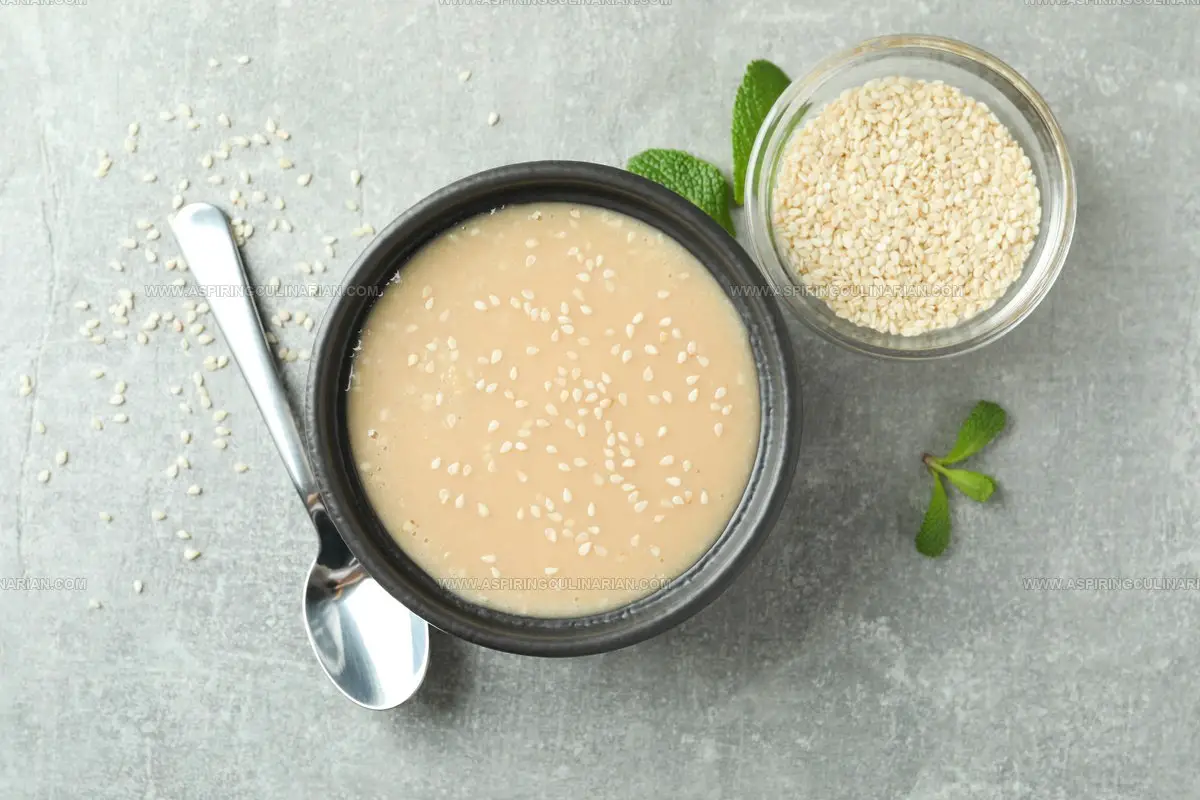
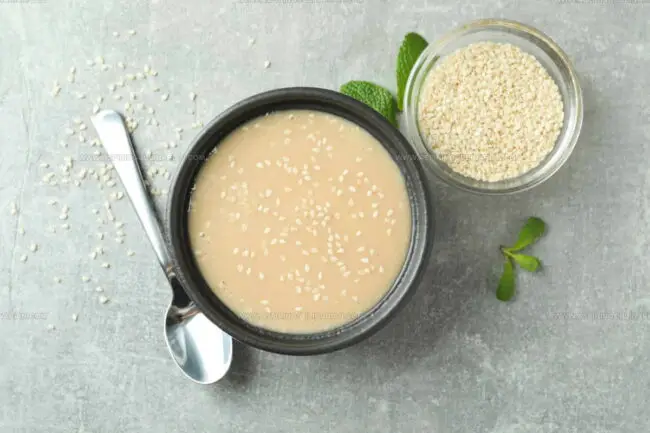
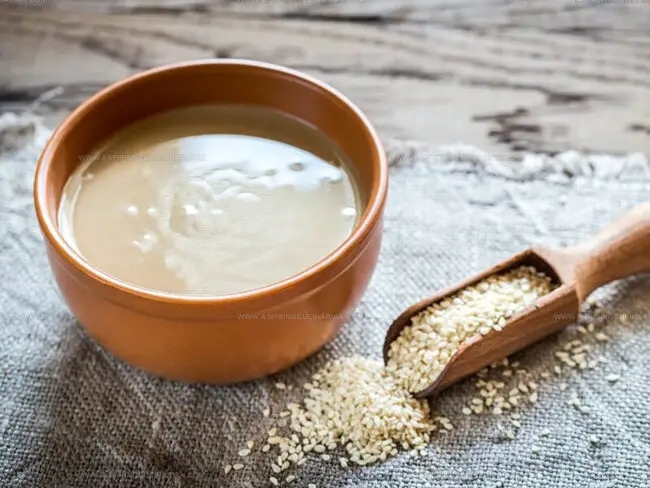
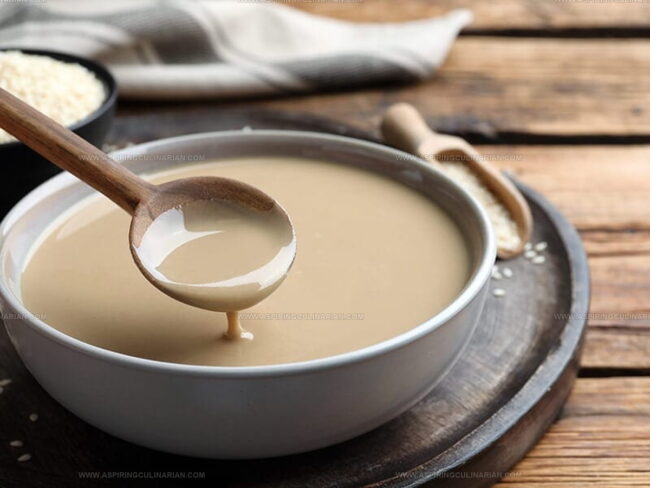
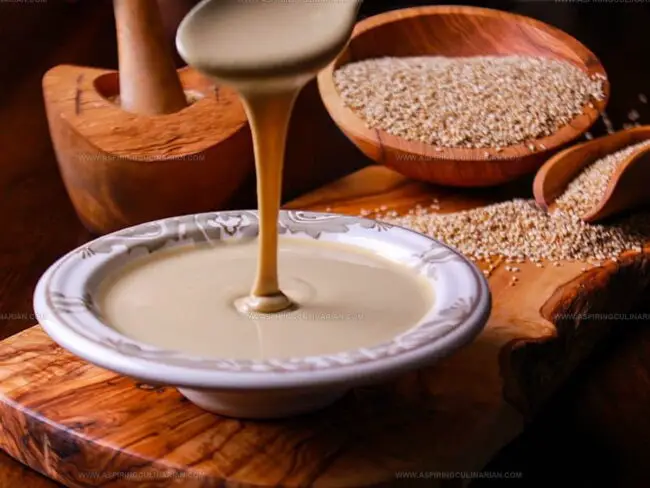
Nathaniel Brooks
Founder & Recipe Developer
Expertise
Farm-to-table cuisine, Seasonal recipe development, Culinary storytelling
Education
Ivy Tech Community College – Indianapolis, IN
Culinary Arts / Hospitality Administration & Events
Focused on hands-on training in classical and modern culinary techniques.
Nathaniel’s story starts in the foothills of the Appalachian Mountains, where farm stands, backyard gardens, and old family recipes shaped his love for real food. After graduating from Ivy Tech Community College in Indianapolis, he spent years working in farm-to-table kitchens, learning how to turn local, seasonal ingredients into something memorable.
Today, Nathaniel pours that same spirit into every single recipe on Aspiring Culinarian – recipes that feel real, comforting, and connected to the land. When he’s not in the kitchen, you’ll find him foraging wild herbs, chasing sunsets with his camera, or writing about the flavors that shaped his roots.